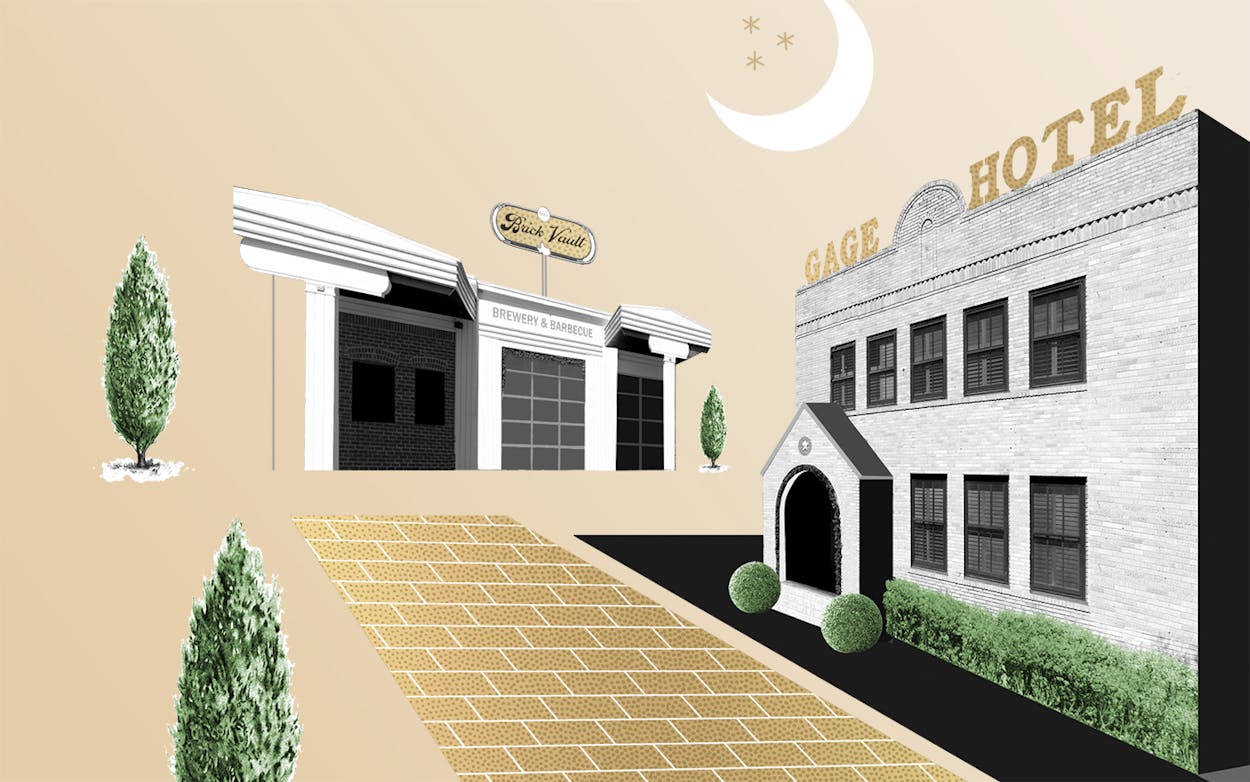Marathon
Pop. 430
Forty years ago, the far West Texas town of Marathon was but a former ranching outpost slowly shriveling away in the blistering sun. Then oil and gas financier J. P. Bryan stepped in. The Freeport native fell in love with the arid expanse of the Big Bend and bought an area ranch.
A great-great-great-nephew of Stephen F. Austin, Bryan majored in art history at the University of Texas at Austin but couldn’t see how he was going to make a living pursuing his passion, so he went to work as an investment banker. He made his fortune with Houston-based Torch Energy Advisors.
In the late seventies, after snatching up that West Texas acreage, he and his wife, Mary Jon, went looking for a house in a nearby town. That’s how they stumbled upon a rat-infested wreck called the Gage Hotel, on Marathon’s Main Street. “It was in complete and utter disrepair,” Bryan recalled. When he discovered that the two-story yellow-brick building was designed by famed architect Henry Trost, of El Paso, he bought the building and proceeded to restore it—not as a residence but as a hotel.
The business floundered at first. “We rebuilt it,” he said, laughing, “and nobody came.”
That gradually changed as other urban expats discovered the little town with clean air and spectacular views at the foot of the Glass Mountains. The Gage, advertising itself as “The Gateway to the Big Bend,” has since become one of the most recognized hotels in the Southwest.
Bryan’s other Marathon businesses now include a construction company and a soon-to-open wellness center, where people who’ve had face-lifts can go to recuperate in secret, he says. Most residents acknowledge that without Bryan, Marathon would likely resemble nearby Valentine, a veritable ghost town, even as they occasionally gripe about his pervasive influence.
“J. P.’s capricious,” one longtime resident grumbled, mentioning how Bryan spent $30,000 or so on a roof before ripping it off and replacing it with another when the original didn’t meet with his approval. “Local folks can’t relate to that.”
Despite his clout, Bryan doesn’t always get his way. Some years ago, he lobbied his Marathon neighbors to consider incorporating, in part to make the town a more likely candidate for grants. Residents leery of bureaucracy said no. “I try to stay out of controversies,” Bryan said, “although there are some people I’d still be willing to get into a fight with.”
Bryan’s philanthropic efforts are focused on the tiny public school, with K–12 enrollment of about seventy. For every Marathon High School graduate who has worked at the Gage or who has a relative who has worked there, J. P. and Mary Jon offer to cover four years of tuition at Sul Ross State University, in nearby Alpine. (If grads want to attend elsewhere, they receive a comparable amount for the college of their choosing.)
Bryan is eighty, but there’s still plenty he hopes to accomplish. He’s working on an application to make the entire town a national historic district. He’d also like to see Marathon become a model for sustainable water use. “I’m retired,” he said. “That means I now have more time to do what I want to do.”
This article originally appeared in the February 2020 issue of Texas Monthly. Subscribe today.
- More About:
- Marathon







